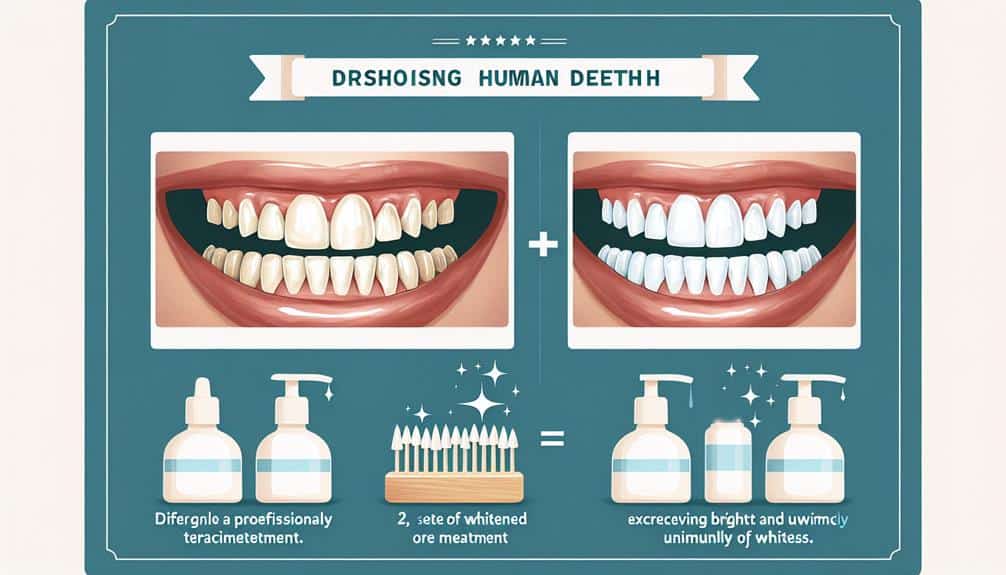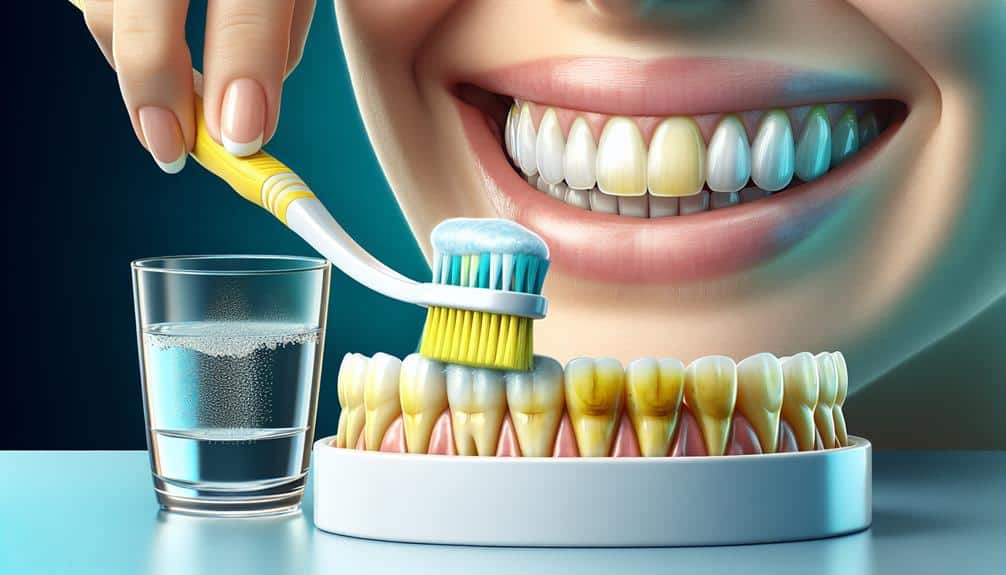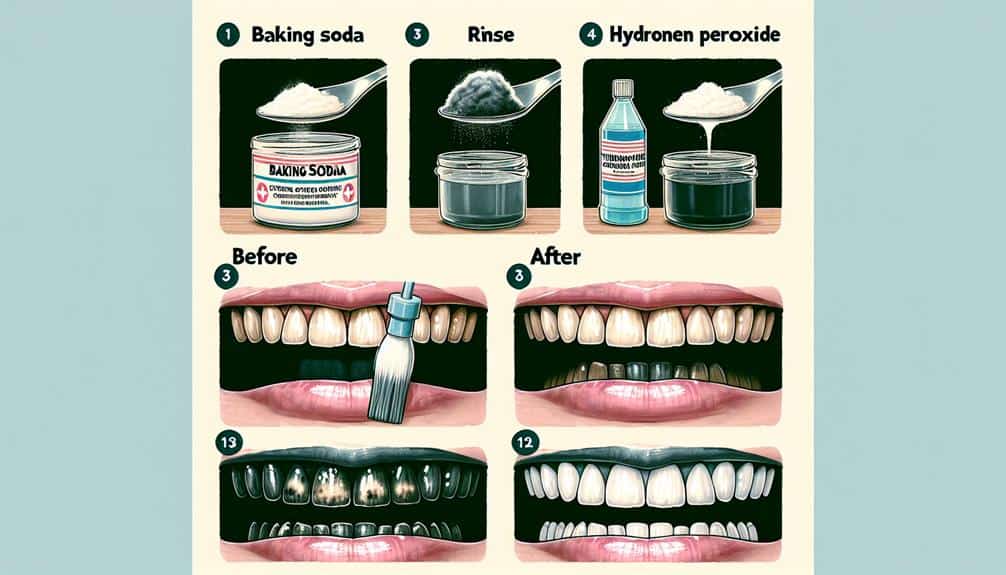When choosing between professional and DIY tetracycline teeth whitening, note the differences. Professional methods, like customized trays and in-office treatments, guarantee consistent and faster results. DIY options, such as baking soda and charcoal, may not be as effective and could harm your enamel. Professionals offer long-lasting effects, but at a higher cost. Safety is key, as aggressive whitening can cause enamel damage. For best results and dental health, consider factors like cost, effectiveness, and safety when deciding your whitening approach. Understand the options to achieve the most favorable outcome for your tetracycline stains.
Key Points
- Professional treatments offer customized trays for consistent whitening results.
- DIY methods like baking soda may not effectively address tetracycline stains.
- Cost comparison shows DIY kits are cheaper but professional treatments last longer.
- Safety risks include enamel damage from aggressive whitening, consult a dentist.
- Professional methods provide quicker, more dramatic improvements than DIY options.
Professional Tetracycline Teeth Whitening Options
When considering professional tetracycline teeth whitening options, consult with a qualified dentist to determine the most suitable treatment plan for your specific needs. Professional treatments typically involve two primary methods: customized trays and in-office treatments. Customized trays are made to fit your teeth precisely and are filled with a whitening agent. This method allows for consistent whitening results as the trays guarantee even distribution of the whitening gel.
On the other hand, in-office treatments are conducted by dental professionals and often involve higher concentrations of whitening agents for faster results. These treatments are carefully monitored to guarantee safety and effectiveness. During an in-office treatment, protective measures are taken to shield your gums and other sensitive areas while the whitening agent is applied to your teeth.
Both customized trays and in-office treatments have their advantages. Customized trays offer convenience and can be used in the comfort of your home, while in-office treatments provide immediate results under professional supervision. Consulting with your dentist will help determine the best option based on your individual needs and preferences.
DIY Tetracycline Teeth Whitening Methods
For those seeking do-it-yourself solutions for whitening tetracycline-stained teeth, various methods can be explored for potential effectiveness. Natural remedies like baking soda and hydrogen peroxide are commonly used at-home techniques for teeth whitening. Baking soda, known for its mild abrasive properties, can help scrub away surface stains on teeth when mixed with water to form a paste. Hydrogen peroxide, a bleaching agent, can also be diluted with water and used as a mouthwash to lighten tooth discoloration. Activated charcoal is another option that's believed to absorb toxins and stains from the teeth, promoting a whiter appearance.
It is important to note that while these natural remedies may show some results, they may not be as effective as professional treatments. DIY methods can take longer to show noticeable changes and may not address deeper stains caused by tetracycline. Additionally, using these at-home techniques incorrectly or too frequently can potentially harm tooth enamel. Consulting with a dentist before trying any DIY whitening methods is recommended to guarantee safety and effectiveness.
Cost Comparison: Professional Vs. DIY Whitening
Comparing the costs of professional teeth whitening treatments with DIY methods provides valuable insights into the financial aspects of achieving a brighter smile. Professional teeth whitening procedures are known for their effectiveness and immediate results, but they often come with a higher price tag. On the other hand, DIY whitening kits are generally more cost-efficient, offering a budget-friendly alternative for those looking to brighten their teeth without breaking the bank.
When considering cost efficiency, DIY whitening methods like at-home whitening trays or strips can be notably cheaper than professional treatments. While professional whitening sessions can cost hundreds of dollars per visit, DIY kits are usually available at a fraction of that cost. However, when evaluating this cost difference against the effectiveness of the whitening results, DIY kits may not provide as significant or long-lasting whitening effects as professional treatments.
Safety Considerations for Tetracycline Stains
To address safety considerations for tetracycline stains in teeth whitening methods, it's important to understand the potential risks associated with the use of certain whitening agents. When dealing with tetracycline stains, safety precautions are pivotal due to the intricate nature of these deep-set discolorations. While over-the-counter whitening products may seem convenient, they often lack the necessary strength to address tetracycline staining effectively. Professional treatments, on the other hand, utilize stronger bleaching agents which can yield better results but also carry higher risks if not administered properly.
Long term effects must also be taken into account when considering tetracycline stain removal. Aggressive whitening methods can lead to enamel damage and increased tooth sensitivity, particularly in cases of deep staining like tetracycline discoloration. It's essential to consult with a dental professional before starting on any whitening treatment, especially when tetracycline stains are involved, to make certain that the chosen method is both effective and safe for your specific needs.
Effectiveness and Results Analysis
When analyzing tetracycline teeth whitening techniques, it's important to evaluate their effectiveness and results thoroughly. Effectiveness evaluation involves examining how well a whitening method can address tetracycline stains specifically. Professional treatments often yield more consistent and noticeable results due to higher concentrations of whitening agents and the expertise of dental professionals. DIY methods, while cost-effective, may vary in effectiveness depending on the product used and the individual's adherence to the instructions.
Results comparison between professional and DIY tetracycline teeth whitening methods reveals that professional treatments generally provide quicker and more dramatic improvements in tooth color. Professional methods can lighten tetracycline stains significantly in just a few sessions, whereas DIY options may require more time and multiple applications to achieve comparable results. It's essential to take into account the trade-off between convenience, cost, and effectiveness when choosing a whitening method for tetracycline stains. Considering the effectiveness and expected results can help individuals make informed decisions to achieve their desired level of whitening.
Frequently Asked Questions
Can Tetracycline Teeth Whitening Methods Cause Sensitivity or Damage to the Teeth?
Using tetracycline teeth whitening methods may lead to tooth sensitivity and enamel damage. It's important to weigh the risks and benefits. Consult a dental professional for personalized advice on tetracycline staining and treatment options.
Are There Any Long-Term Effects or Risks Associated With Tetracycline Teeth Whitening?
Long-term effects of tetracycline teeth whitening include increased tooth sensitivity and potential enamel damage. Risks may arise from excessive use and incorrect application. Following safety precautions and consulting a professional can mitigate risks while reaping benefits.
How Does Tetracycline Staining Differ From Other Types of Tooth Discoloration?
When it comes to tetracycline staining analysis, understanding how it differs from other types of tooth discoloration is essential. Treatment comparisons reveal the unique challenges posed by tetracycline staining, requiring specialized approaches for effective whitening results.
Can Tetracycline Teeth Whitening Methods Effectively Remove Deep-Set Stains?
To remove deep-set tetracycline stains effectively, consider professional treatments for thorough results. DIY methods may not penetrate as deeply. Professional whitening offers advanced techniques and stronger solutions, ensuring better outcomes in addressing stubborn discoloration.
Are There Any Dietary or Lifestyle Changes That Can Help Maintain the Results of Tetracycline Teeth Whitening Treatments?
To maintain results of tetracycline teeth whitening treatments, consider dietary changes and lifestyle habits. Opt for stain-resistant foods like fruits and vegetables, limit sugary snacks, and follow good oral hygiene practices. Avoid tobacco and excessive coffee or tea consumption.



